How long-term investment can help us cope with short-term uncertainty


The short-term investment outlook may be uncertain, but let dividends pay us to be patient, says Ian Cowie, Personal Finance Editor, the Daily Telegraph.
Investors face extreme uncertainty in the short-term because of the coronavirus crisis and Brexit; taking a long-term view of investment can help us cope with this uncertainty and put our present problems in perspective.
For example, in more than 30 years since this DIY investor began working in the City, there have been several stock market shocks.
These included Black Monday, 1987; the bursting of the dot-com bubble in 2000; and the global financial crisis in 2008. All of them depressed confidence and prices temporarily, causing losses for short-term speculators.
All of them subsequently saw confidence and prices recover, creating wealth for long-term investors.
The past is not a guide to the future but it is interesting to note that the FTSE 100 index of Britain’s biggest shares ended 1987 below 1,780; and closed 2000 below 6,300; then finished 2008 beneath 4,200. At the time of writing, this benchmark of blue-chip shares currently trades above 6,500.[1]
[1] Source: ‘A history of the London Stock Market’ George Blakey, Harriman House, plus London Stock Exchange
Get time on your side
The longer you can afford to remain invested, the less likely you are to be forced to sell when share prices are temporarily depressed; that’s why it is sometimes said that you should not invest money in shares that you are likely to need back within five years.
For example, a major bank has analysed returns from shares reflecting the changing composition of the London Stock Exchange, cash deposits and government bonds since 1899.[2]
This analysis found that if an investment was held for only two consecutive years, there was a 69% probability that shares would deliver higher returns than deposits and a 67% chance they would beat bonds. Put another way, the probability that shares would do best was over two-in-three.
However, if the investment was held for any period of five consecutive years, shares did better than cash 76% of the time and beat bonds in 72% of these periods. So, holding shares for longer improved the historical probability in favour of them doing best to nearer three-in-four. Where shares were held for 10 years, they did better than cash 91% of the time and beat bonds 77% of the time
[2] Source: Barclays Equity Gilt Study 2020
Spread risk
Investors seek to earn higher rewards than bondholders or depositors by accepting higher risks; share prices can fall without warning and you might get back less than you invest.
Brexit and the coronavirus provide current examples of how unpredictable events can influence equity valuations and investment returns.
Diversification can diminish risk by spreading our money over a wide range of assets to reduce our exposure to setbacks or failure at any single company, country or currency.
Investment trusts automatically diminish risk by diversification because most hold dozens of different underlying shares within their professionally managed portfolios.
The principle is the same as Granny’s advice not to have all your eggs in one basket; in practice, a diversified portfolio would have aimed to avoid investing too much money in technology shares in 2000 or financial shares in 2008.
Lest all that sounds historic, here and now just five shares - Facebook, Apple, Amazon, Netflix and Google (listed in New York as Alphabet) - comprise a fifth of the value of the Standard & Poor’s 500 index.
So, these technology giants, that form just 1% of the corporate constituents of this broad measure of the American market, comprise 20% of its value.
Surviving stock market storms
Today’s worries may seem unprecedented, but several investment trusts have survived events that put them in perspective. For example, JPMorgan American (stock market ticker: JAM) was founded in 1881 and Mercantile (MRC), in the UK All Companies sector, was founded in 1884; so both survived the Spanish flu of 1918, which is thought to have caused more than 20M deaths, the Great Depression and both World Wars.
No open-ended investment company (OEIC) or unit trust can point to similar longevity. More positively, investors in JPMorgan American have been rewarded for taking a medium to long-term view.
They have received total returns of 12% over the last year; 98% over the last five years; and 291% over the last decade, according to independent statisticians Morningstar via the Association of Investment Companies (AIC).[3]
Meanwhile, as Brexit continues to create uncertainty about British stock market valuations, Mercantile suffered shrinkage of 9.1% last year but delivered total returns of 32% and 169% over the last five and 10-year periods.
Past Performance is not an indication of future performance
[3] Source: Association of Investment Companies
Sustaining and increasing income
Mercantile currently yields dividend income of 3.3% which has risen by an annual average of 10% over the last five years.
So, while dividends are not guaranteed and can be cut or cancelled without notice, if Mercantile’s distributions continue to rise at their current rate, shareholders’ annual income would double in just over seven years.
Unfortunately, the coronavirus crisis is forcing many companies to cut, cancel or defer dividend distributions.
For example, more than half the corporate constituents of the FTSE 100 index have disappointed shareholders’ hopes of receiving income during 2020. Fortunately, most investment trusts have sustained shareholders’ income.
The explanation is that investment trusts are allowed to retain up to 15% of their returns in good years, so they can top up or sustain dividend distributions to shareholders in bad years.
Some investment trusts have done even better and actually increased shareholders’ income every year over several decades.
For example, JPMorgan Claverhouse (JCH), in the UK Equity Income sector, has raised its dividend every year for an impressive 47 years. JPMorgan Claverhouse currently yields 5.4% and has increased its dividends by an annual average of 7.7% over the last five years. If that rate of rise was sustained, shareholders’ income would double in less than a decade.
However, it is only fair to add that this trust has not been immune to uncertainty about Brexit that has blighted its sector. It shrank by 20% last year but delivered positive returns of 10% and 77% over the last five and 10 years.
Don’t panic, be patient
The coronavirus might pose a more serious threat to the global economy than stock market setbacks in 1987, 2000 or 2008; we just don’t know yet.
But Spanish flu, the Great Depression and both World Wars were comparable threats to the global economy, and, in all cases, the crisis was followed by recovery.
There is no guarantee that it will happen again, but some short-term indications are encouraging. Immediately before the coronavirus caused the first lockdown in England last March, I contrasted the reaction of bulls - or optimists - and bears - or pessimists.
Amid falling share prices and investor confidence, I wrote: “While the bears may briefly enjoy their picnic, I continue to believe optimists gain more from long-term market trends than pessimists can profit from short-term setbacks.”[4]
On March 23, the FTSE 100 slumped to its 2020 low-point of 4,993. Since then it has risen by more than 31%. Similarly, the Dow Jones Index of American blue chip or big company shares slipped to trade at 18,592 that day but has subsequently bounced back by 61%. New York’s NASDAQ index of technology shares did even better, soaring 80% higher than its 2020 low-point.[5]
Whether we look at the current crisis; those of the last 30 years; or even go back over more than the last century; we can see that share prices may fall without warning in the short term but tend to recover over the medium to long term.
Investment trusts diminish the risk of stock markets by diversification and can sustain rising income payments to shareholders. So it makes sense to take a long view of investment, let dividends pay us to be patient and resist the temptation to panic.
[4] Source: Citywire, March 10, 2020
[5] Source: Bloomberg, December 4, 2020
Click to visit:
To buy these trusts login to your EQi account
Select:
JP Morgan American (JAM) – GB00BKZGVH64
Mercantile (MRC) – GB00BF4JDH58
JP Morgan Claverhouse (JCH) - GB0003422184
This is a marketing communication and as such the views contained herein do not form part of an offer, nor are they to be taken as advice or a recommendation, to buy or sell any investment or interest thereto. Reliance upon information in this material is at the sole discretion of the reader. Any research in this document has been obtained and may have been acted upon by J.P. Morgan Asset Management for its own purpose. The results of such research are being made available as additional information and do not necessarily reflect the views of J.P. Morgan Asset Management. Any forecasts, figures, opinions, statements of financial market trends or investment techniques and strategies expressed are unless otherwise stated, J.P. Morgan Asset Management’s own at the date of this document. They are considered to be reliable at the time of writing, may not necessarily be all inclusive and are not guaranteed as to accuracy. They may be subject to change without reference or notification to you. It should be noted that the value of investments and the income from them may fluctuate in accordance with market conditions and taxation agreements and investors may not get back the full amount invested. Changes in exchange rates may have an adverse effect on the value, price or income of the products or underlying overseas investments. Past performance and yield are not reliable indicators of current and future results. There is no guarantee that any forecast made will come to pass. Furthermore, whilst it is the intention to achieve the investment objective of the investment products, there can be no assurance that those objectives will be met. J.P. Morgan Asset Management is the brand name for the asset management business of JPMorgan Chase & Co. and its affiliates worldwide. To the extent permitted by applicable law, we may record telephone calls and monitor electronic communications to comply with our legal and regulatory obligations and internal policies. Personal data will be collected, stored and processed by J.P. Morgan Asset Management in accordance with our EMEA Privacy Policy www.jpmorgan.com/emea-privacy-policy. Investment is subject to documentation. The Annual Reports and Financial Statements, AIFMD art. 23 Investor Disclosure Document and PRIIPs Key Information Document can be obtained free of charge from JPMorgan Funds Limited or www.jpmam.co.uk/investmenttrust. This communication is issued by JPMorgan Asset Management (UK) Limited, which is authorised and regulated in the UK by the Financial Conduct Authority. Registered in England No: 01161446. Registered address: 25 Bank Street, Canary Wharf, London E14 5JP.
Material ID: 0903c02a82aab94c
Read the latest edition of DIY Investor Magazine
DIY Investor Magazine
The views and opinions expressed by the author, DIY Investor Magazine or associated third parties may not necessarily represent views expressed or reflected by EQi.
The content in DIY Investor Magazine is non-partisan and we receive no commissions or incentives from anything featured in the magazine.
The value of investments can fall as well as rise and any income from them is not guaranteed and you may get back less than you invested. Past performance is not a guide to future performance.
DIY Investor Magazine delivers education and information, it does not offer advice. Copyright© DIY Investor (2016) Ltd, Registered in England and Wales. No. 9978366 Registered office: Mill Barn, Mill Lane, Chiddingstone, Kent TN8 7AA.

